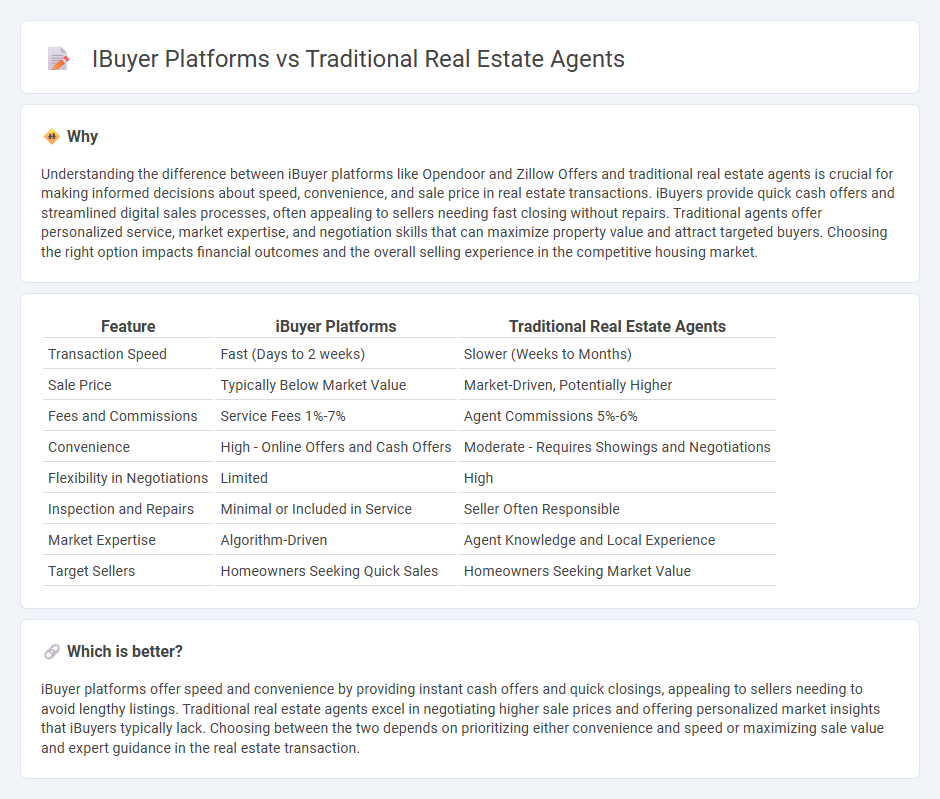
iBuyer platforms leverage technology and algorithms to provide homeowners with instant cash offers, streamlining the selling process by eliminating lengthy negotiations and showings common in traditional real estate transactions. Traditional real estate agents offer personalized market expertise, negotiation skills, and local knowledge, often resulting in higher sale prices despite a longer selling timeline. Explore the key differences between iBuyer platforms and traditional real estate agents to determine which option suits your property goals best.
Why it is important
Understanding the difference between iBuyer platforms like Opendoor and Zillow Offers and traditional real estate agents is crucial for making informed decisions about speed, convenience, and sale price in real estate transactions. iBuyers provide quick cash offers and streamlined digital sales processes, often appealing to sellers needing fast closing without repairs. Traditional agents offer personalized service, market expertise, and negotiation skills that can maximize property value and attract targeted buyers. Choosing the right option impacts financial outcomes and the overall selling experience in the competitive housing market.
Comparison Table
| Feature | iBuyer Platforms | Traditional Real Estate Agents |
|---|---|---|
| Transaction Speed | Fast (Days to 2 weeks) | Slower (Weeks to Months) |
| Sale Price | Typically Below Market Value | Market-Driven, Potentially Higher |
| Fees and Commissions | Service Fees 1%-7% | Agent Commissions 5%-6% |
| Convenience | High - Online Offers and Cash Offers | Moderate - Requires Showings and Negotiations |
| Flexibility in Negotiations | Limited | High |
| Inspection and Repairs | Minimal or Included in Service | Seller Often Responsible |
| Market Expertise | Algorithm-Driven | Agent Knowledge and Local Experience |
| Target Sellers | Homeowners Seeking Quick Sales | Homeowners Seeking Market Value |
Which is better?
iBuyer platforms offer speed and convenience by providing instant cash offers and quick closings, appealing to sellers needing to avoid lengthy listings. Traditional real estate agents excel in negotiating higher sale prices and offering personalized market insights that iBuyers typically lack. Choosing between the two depends on prioritizing either convenience and speed or maximizing sale value and expert guidance in the real estate transaction.
Connection
iBuyer platforms and traditional real estate agents both facilitate property transactions but operate with distinct models; iBuyers use technology and cash offers to provide quick sales, while agents offer personalized services and market expertise. Many agents now collaborate with iBuyer companies to offer clients faster selling options without foregoing professional guidance. This hybrid approach leverages the efficiency of digital platforms and the trust built through agent-client relationships, enhancing market liquidity and buyer-seller satisfaction.
Key Terms
Commission Structure
Traditional real estate agents typically charge a commission of 5% to 6% on the home sale price, splitting fees between buyer and seller agents. iBuyer platforms, such as Opendoor and Zillow Offers, often charge service fees ranging from 5% to 14%, which can be higher but offer faster, cash-based transactions with less negotiation. Explore the advantages and cost implications of each model to determine the best fit for your property sale needs.
Selling Timeline
Traditional real estate agents typically require 30 to 60 days to close a sale due to property showings, negotiations, and financing contingencies, whereas iBuyer platforms offer near-instant offers and can close transactions within 7 to 14 days. iBuyers leverage algorithms and market data to provide fast, cash-based sales, reducing waiting times and uncertainties commonly associated with traditional methods. Discover more about how selling timelines impact your home selling decision and explore which option suits your needs best.
Service Model
Traditional real estate agents offer personalized, hands-on service with expertise in market negotiation, local insights, and tailored marketing strategies, often resulting in higher sale prices. iBuyer platforms use technology-driven algorithms to provide instant cash offers and faster transactions, appealing to sellers prioritizing convenience and speed over customized service. Explore how these distinct service models impact your property selling experience.
Source and External Links
Flat-Fee Agent vs. Traditional Agents: What is the Difference? - Traditional real estate agents earn a commission (typically 2.5-3% of the home's sale price), which is usually paid by the seller, and are incentivized to secure higher sale prices due to their income being directly tied to the transaction amount.
 dowidth.com
dowidth.com